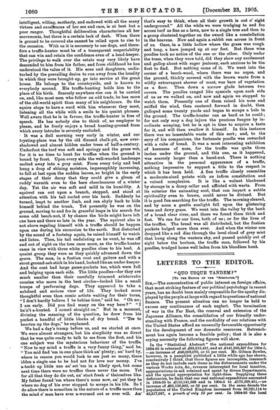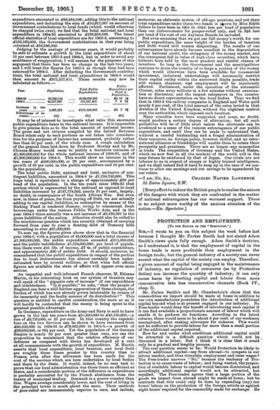" QUO USQUE TANDEM?"
SIR,—The concentration of public interest on foreign affairs, that most striking feature of our political psychology in recent years, has no doubt been mainly responsible-for the apathy dis- played by the people at large with regard to questions of national finance. The present situation can no longer be held to excuse any continuance of such neglect. The termination of war in the Far East, the renewal and extension of the Japanese Alliance, the consolidation of our friendly under- standing with France, and the cordiality of our relations with the United States afford an unusually favourable opportunity for the development of our domestic resources. Retrench.
ment has again become a feasible policy ; that it is also a crying necessity the following figures will show.'
In the "Statistical Abstract" the national expenditure for 1894-95 is returned at 293,918,421, and at £141,956,497 for 1904-5, —an increase of 248,038,076, or 51 per cent. Mr. Gibson Bowles, however, in a pamphlet published a little while ago has shown, conclusively I think, that these figures are incomplete, inasmuch as they do not include such items as the disbursements under the various Works Acts, &c., revenue intercepted for local taxation, appropriations-in-aid retained and spent by divers Departments, and the special appropriation for light-dues. Supplying these deficiencies, he finds that our real national expenditure amounted in 1894-95 to 2110,141,569 and in 1904-5 to £175,298,451,—an increase of 265,156,882, or 59 per cent. In the same decade the population of the United Kingdom increased from 39,220,114 to 43,217,687, a growth of only 10 per cent.• In 1894-95 -the local
expenditure amounted to £89,434,106; adding this to the national expenditure, and deducting the sum of £10,917,087 on account of Government contributions to local funds (which would otherwise be charged twice over), we find that the total national and local 'expenditure in 1894-95 amounted to £188,658,588. The latest official statistics of local expenditure are for 1902-3, amounting to £152,165,000, the Government contributions in that year being returned at £16,246,000.
Judging by the analogy of previous years, it would probably be safe to estimate a growth in the local expenditure of about 15 per cent between 1902-3 and 1904-5, but in order to avoid any semblance of exaggeration. I will assume for the purposes of this argument that there has been no change in the last two years, and I will treat the figures for 1902-3 as though they had been returned for 1904-5. After deducting the Government contribu-
tions, the total national and local expenditure in 1904-5 would then amount to £311,217,431. These results may now be tabulated as follows :— Public
Total Public Expenditure per
Expenditure. Rend of Population.
1894-95 39,220,114 2188,658.585 £4 16 2i 1904-5 4.3,217,687 311,217,451. 7 4 Of Increase in ten
years 3,997,573 £122,558,863 £2 7 9f Percentage of in-
crease 10% • 65% 49% It may be of interest to investigate what ratio this enormous public expenditure bears to the national income. It is impossible to give precise data as to the total amount of national income. The gross and net returns compiled by the Inland Revenue Board relate only to such portions as are taken into considera- tion for the purposes of Income-tax assessment, probably rather less than 50 per cent. of the whole sum. A rough calculation of the general lines laid down by Professor Bewley and by Mr. Chiozza-Money would seem to justify a tentative estimate of £1,400,000,000 for the whole national income of 1894-95, and of £1,800,000,000 for 1904-5. This would show an increase in the ten years of £400,000,000, or 29 per cent., accompanied by a growth of 65 per cent. in the public expenditure and 10 per cent.
in the population. The total public Debt, national and local, exclusive of con- tingent liabilities, amounted in 1904-5 to £1,294,700,000. This huge total is equivalent to a charge of approximately £30 per
head of the population. In the ten years since 1894-95 that portion which is represented by the national as opposed to local liabilities increased by £137,734,932, nearly 21 per cent., largely, no doubt, in consequence of the South African War. But even now, in times of peace, far from paying off Debt, we are actually adding to our capital liabilities, as redemption by means of the Sinking Fund is rendered illusory, owing to concurrent fresh borrowings under the various Public Works Acts, and in the year 1904-5 there actually was a net increase of £2,238,391 in the gross liabilities of the nation. Attention should also be called to the mischievous practice which has recently obtained of carrying forward from year to year a floating debt of Treasury bills
amounting to over £21,000,000. To sum up, the figures given above show that in the financial year 1904-5, with a population of 43,000,000 and a total income of
£1,800,000,000, the public expenditure exceeded £311,000,000, and the public indebtedness £1,294,000,000; per head of popula- tion there were £41 13s. of income, £7 4s. of public expenditure, and approximately £30 of public Debt. It should, moreover, be remembered that the public expenditure in respect of the portion due to local disbursements has almost certainly been under- estimated here by several millions, so that when full official
figures are available the state of affairs will appear even more serious.
An impartial and well-informed French observer, M. Etienne Martin, in his interesting book on our system of taxation may well speak of the " gigantic rate of increase" of our expenditure and indebtedness. " Is it possible," he asks, " that the people of England can bear a still further aggravation of these charges, the burden of which has now already grown intolerable by reason of its immensity and the faulty manner of its distribution?" This question is entitled to careful consideration, the more so as it will hardly be contended that the money is being spent to the greatest possible advantage. In Germany, expenditure on the Army and Navy is said to have grown in the last ten years from £34,830,000 to £43,550,000,—a rise of £8,720,000, or 25 per cent. In this country the expendi- ture on the two Services can be shown to have increased from £40,203,000 in 1894-95 to £79,862,000 in 1904-5,—a growth of £39,659,000, or 98i per cent. Yet the population of the German Empire is nearly 50 per cent. greater than ours, nor can the proposition be maintained that the relative efficiency of our
defences as compared with theirs has developed at a rate at all commensurate with the growth of expenditure. M. Martin asserts that local expenditure, local taxation, and local Debt are roughly three times greater in this country than in France, even after due allowance has been made for the cost of the services which are here undertaken by local bodies
and there by the State. It would, indeed, be no easy task to prove that our local administration was three times as efficient as theirs, and a considerable portion of the difference in expenditure is probably accounted for by the French abstinence from the luxury of municipal trading. Denmark is a poorer country than this. Wages average considerably lower, and the cost of living in the principal towns is much about the same. Their methods of poor-relief are immeasurably superior to ours, and include, Year. Population.
But even assuming that we got our full money's-worth for our public expenditure, the mere weight of the burden of taxation and Debt would still remain disquieting. The results of our extravagance have already become manifest in the depreciation of our national credit, the stringency of the money market, and the consequent fall in value of high-class securities, which have hitherto been held by the most prudent and careful classes of investors. So long as the Government and the municipalities continue to drain the country of so large a portion of the money which would otherwise have been available for commercial investment, industrial undertakings will necessarily restrict their capital outlay within the narrowest limits possible, trade will remain stagnant, and employment will be injuriously affected. Parliament, under the operation of the automatic Closure, votes away millions in a few minutes without examina- tion or discussion, and the largest ratepayers in the country have no direct representation on the local bodies. Thus we find that in 1902-3 the railway companies in England and Wales paid nearly 8 per cent. of the total amount of the rates levied in that division of the United Kingdom, without the slightest control over the authorities which imposed such taxation.
Many remedies have been suggested, and some, no doubt, would produce a certain degree of alleviation ; but all such palliatives will be of little avail unless the electorate can be awakened to a sense of the ruinous extravagance of our public expenditure, and until they can be made to understand that, without a careful husbanding and a frugal administration of their resources, no foreign policy, however skilful, and no inter- national alliances or friendships will enable them to retain their prosperity and greatness. There are no longer any monopolies in trade. The competition of Germany and the United States, which we now feel in all the markets of the world, will in the near future be reinforced by that of Japan. Our rivals are not inferior to us in respect of energy or highly trained intelligence, and we shall indeed find it hard to keep up in the race if we con- tinue to allow our earnings and our savings to be squandered by our rulers.
—I am, Sir, &e., CHARLES NAPIER LAWRENCE.
23 Eaton Square, S.W.
[Every effort to induce the British people to realise the nature of the dangers with which they are confronted in the matter of national extravagance has our warmest support. There is no subject more worthy of the anxious attention of the nation.—ED. Spectator.] PROTECTION AND EMPLOYMENT.







































 Previous page
Previous page